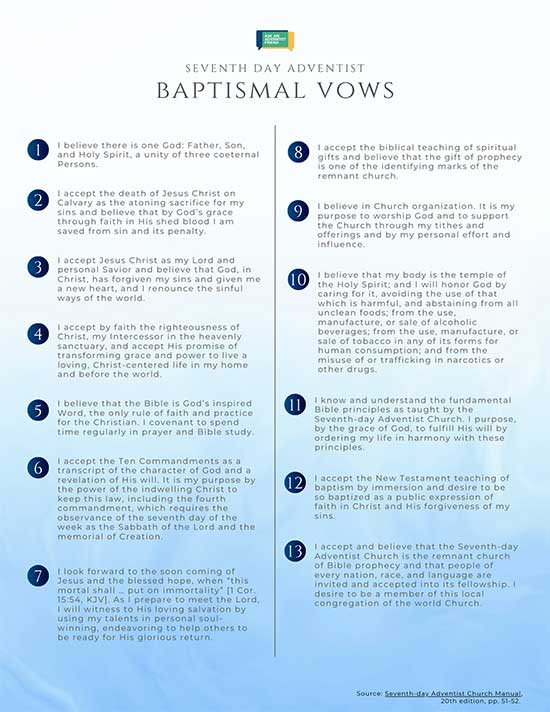(And it’s worth noting that you don’t have to be a member of an Adventist Church to attend its worship services and other church activities. You are always welcome and celebrated!)
If you’re looking to officially become a member of an Adventist Church, it involves accepting the denomination’s collective beliefs. And realistically, this also means acknowledging that you’re joining a faith community of human beings who share some traditions and expectations—along with some potential idiosyncrasies and quirks. (And this would be the case for joining just about any Protestant Christian faith community.)
But in general, the expectations among Adventists are simple and straightforward. And they’re related to truths from the Bible that Adventists together embrace.
Nonetheless, accepting these beliefs is not at all about earning salvation. That is a gift received by faith in Christ and has nothing to do with church membership. So to be extra clear, this page doesn’t focus on how to be saved.
Rather, we’re here to look at what beliefs and lifestyle choices come with being part of an Adventist community. You can expect to learn:
To answer the question you came here for, let’s first understand the distinctions between being saved, being an Adventist, and being a member of the Adventist Church.
What does “becoming an Adventist” mean?

Photo by Aaron Burden on Unsplash
Seventh-day Adventism is about following Christ; all our other beliefs stem from His love and His gift of salvation, as shown in the Bible. Thus, anyone who holds these beliefs could consider themselves an Adventist believer.
But again, to be clear, we’re not saying that someone needs to be an Adventist in order to get to know Jesus Christ or to be saved. Absolutely not. Salvation is a decision you make in your heart, between you and God, as it says in Romans 10:9:
“If you confess with your mouth that Jesus is Lord and believe in your heart that God raised Him from the dead, you will be saved” (ESV).
So if you’ve ever been concerned that you need to be part of a certain church to be saved, rest assured this isn’t the case. So now we’ll focus on what it means to be a Seventh-day Adventist Christian.
(If you want to learn more about how salvation works, see “What Is Salvation and How Do I Get Saved?”)
As we’ve mentioned, there is a set of “fundamental beliefs” that describe how Adventism approaches Scripture and how Adventists seek to apply its principles to our lives. If you align with those beliefs, you would, by definition, be an Adventist.
Distinct from this is the process of membership in the Adventist Church.
Church membership refers to officially accepting Adventist beliefs and joining by baptism or by profession of faith (if you’ve been baptized in another Protestant Christian denomination). We’ll talk about that process next.
Prerequisites for becoming a member of the Adventist Church
Church membership involves three steps, as expressed in the Seventh-day Adventist Church Manual1:
- Baptism
- Acceptance of the truths of the Bible as taught in the Fundamental Beliefs of the Adventist Church
- Formal acceptance as a member
These prerequisites align with Jesus’ instructions to make disciples by both baptizing and teaching them:
“Go therefore and make disciples of all the nations, baptizing them in the name of the Father and of the Son and of the Holy Spirit, teaching them to observe all things that I have commanded you” (Matthew 28:19-20, NKJV).
Here’s a little more about each one.
Baptism
 Baptism is a public announcement of a person’s decision to follow Christ. It symbolizes the person allowing their old life to die with Christ’s sacrificial death so they can live a new life in Him (Romans 6:3-4).
Baptism is a public announcement of a person’s decision to follow Christ. It symbolizes the person allowing their old life to die with Christ’s sacrificial death so they can live a new life in Him (Romans 6:3-4).
The Bible teaches that when we’re baptized, we’re joining the body of Christ—the Church (1 Corinthians 12:13). Thus, the logical next step after baptism is joining a community of believers.
In some cases, a person who wants to join the Adventist Church may already be “a committed Christian coming from another Christian communion who has already been baptized by immersion.”2 This person may join by a “profession of faith”—a verbal acknowledgment—rather than being baptized again.
This is because baptism, like accepting Jesus, doesn’t need to be repeated (unless an individual feels convicted to officially recommit themselves to following Him). In many cases, an individual has already made a decision to follow Jesus and has shown that publicly through baptism prior to learning about Adventism. So, joining the Adventist Church is simply a continuation of that journey.
Acceptance of the Fundamental Beliefs of the Adventist Church
When a person decides they would like to become part of the Adventist Church, a pastor or other church member will study the Bible together with them so they fully understand the decision they’re making. This also provides one-on-one time with a pastor or elder to ask any questions they might have.
This study will usually happen over many weeks before baptism or profession of faith.
After finishing the baptismal study, a person will be asked to affirm baptismal vows that show their acceptance of the beliefs of the Adventist Church. There are 13 of them, and they’re mostly a summary of our 28 Fundamental Beliefs.
These vows include both beliefs and lifestyle choices that encompass what it means to be a Seventh-day Adventist.
Beliefs such as:
- The Godhead/Trinity
- Salvation through Jesus’ death on the Cross
- Jesus’ ministry in the heavenly sanctuary
- The Bible as God’s inspired Word
- The Ten Commandments (including the Sabbath)
- The Second Coming of Jesus
- Spiritual gifts and the gift of prophecy
Some of the beliefs also address practical aspirations and applications like:
- Spending regular time in prayer and Bible study
- Supporting the church with tithe and offerings
- Choosing to avoid unclean meat, alcohol, tobacco, and narcotics out of a desire to care for the bodies God created for us
- Being baptized by immersion
Formal acceptance as a member
Once an individual has been baptized, the church will take a vote to accept them into membership. This “vote,” though, is just an official way of showing that the church is welcoming the new member with open arms. In other words, its presentation as a “vote” gives the whole church the chance to say, “Yes!”
Norms within the Adventist Church

Photo by NordWood Themes on Unsplash
Every community has its norms and sets of expectations. The Adventist Church is no different. And though these norms are not requirements for membership, you will definitely run into them if you spend much time around Adventists.
One of the most common is the aspiration toward healthy living. Out of a desire to be good stewards of our bodies, many members choose to eat a vegetarian diet and avoid drinking caffeine. And in many places, you might find that the church potluck, or fellowship dinner after the church service, is mostly vegan dishes.
Though it’s a typical aspect of Adventist culture, vegetarianism is by no means a test of membership. Each individual should choose what they feel is best for their bodies and their health in their current circumstances.
Another typical norm is minimal adornment or use of jewelry.
If you walk into an Adventist church, you might not see as many people wearing necklaces, bracelets, or earrings. Some even prefer not to wear wedding rings. There are no official guidelines about individual pieces of jewelry, though. In general, this focus is out of a desire to live simple, modest lives.
Again, though, we recognize this is a personal choice between an individual and God. Each of us is unique, and individual self-expression is ultimately between a person and God. If someone is wearing jewelry, they should expect to be treated no differently by church members.
One other norm you may encounter is an emphasis on the writings of Ellen White, who some Adventists believe to have had the gift of prophecy (1 Corinthians 12:10; Romans 12:3-8). She was a co-founder of our denomination, and she wrote a large number of books, manuscripts, and letters that point people to Jesus and the Bible, so you may hear church members referring to things she wrote or said.
But it’s not a requirement for you to read her writings or learn all her specific counsel. (And if she were alive today, she’d tell you to read the Bible first, anyway!3)
Accepting Ellen White as a prophet is not mandatory in order to be an Adventist. Though we would encourage you to learn about her and judge for yourself whether she had the spiritual gift of prophecy.
That’s the beauty of growing together in Christ in the Adventist Church. We can unite on core beliefs while still seeking God’s will individually through Scripture and prayer.
(For more on Adventist norms, see “Do Seventh-day Adventists Have ‘Rules’?”)
Adventists want to support you in your spiritual journey
Wherever you are in your spiritual journey, you can know that God hears your prayers and His Holy Spirit will guide you. He has promised to lead every sincere seeker to the liberating truths of His Word. He will also lead you to the right faith community where you can continue to grow and follow Him.
If you’re curious about the Adventist Church and what it would be like to join one of our local congregations, a good way to find out would be to attend a service at one nearby. Whether you’re a member or not, you can expect to be welcomed by people who are sincerely glad you’re there.
You may even decide you’d like to learn more about our beliefs. In that case, a pastor, church elder, or Bible worker would be happy to talk with you, answer your questions, and study the Bible with you.
To get started, find a church near you and contact them through their website, Facebook page, phone number, or whichever is most convenient for you. Or attend in person! We’d love to support you in your journey.
To learn more about what to expect the first time you attend an Adventist Church, check out our walk-through of a typical service and Sabbath School.
- Seventh-day Adventist Church Manual, 20th edition, pp. 49-56. [↵]
- Ibid., p. 56. [↵]
- White, Ellen G., The Review and Herald (January 20, 1903), par. 9. [↵]
More Answers
Evangelism
Evangelism is simply sharing the truths of the Bible with someone else. And Adventists are all into it.
Everything You Need to Know About an Adventist Church Potluck
Every so often, usually on a schedule ranging from once a week to once a month to once a quarter, an Adventist church will have “fellowship dinners,” often casually referred to as potlucks.
The Seventh-day Adventist Hymnal
The Seventh-day Adventist Hymnal is a songbook used worldwide by many Adventist congregations during their worship services. Since its publication in 1985, it has helped foster praise to God while reminding church members of our mission and drawing them closer to Jesus.
What Are Seventh-Day Adventist Sermons Like?
In nearly every Seventh-day Adventist Church, the sermon is the focal point of the main service—similar to many Protestant Christian denominations. It is a time of biblical instruction by the pastor, who shares what they’ve been studying in the Bible and preparing over the previous week.
Who Are Adventists
The Seventh-day Adventist Church—“Adventists” for short—is a Christian denomination of ordinary people who seek to follow Jesus and live out His mission in this world. Established in 1863, we hold to the Protestant principle of sola scriptura, which means the Bible guides everything we do.
Why is the Great Controversy in my mailbox?
Every year, households across North America receive free copies of a 150-year-old book, The Great Controversy. Millions more are shared around the world.
How do Adventists choose what to eat?
Food blogs overwhelm the internet; food fads are all the rage; and copycat and healthy versions of food are the subject of many a get-together.








